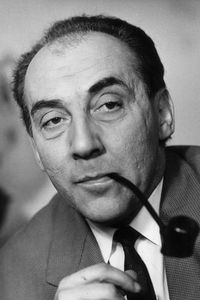Miloš Kopecký was a renowned Czech actor, whose illustrious career spanned the latter half of the 20th century. Born into a family of craftsmen, Kopecký's early life was deeply rooted in music and theater, with his involvement starting as a member of an amateur elocution group in 1939. During the German occupation of Czechoslovakia, he performed alongside numerous young artists, showcasing his talent and versatility.
Tragedy struck when Kopecký's mother was brutally murdered at Auschwitz concentration camp due to her Jewish heritage, while he himself was interned in the labor camp Bystřice u Benešova. These harrowing experiences would later contribute to his struggles with Bipolar Disorder, then known as Manic-Depressive Disease.
Following the liberation, Kopecký began his acting career in the avant-garde studio Větrník in 1945. He later joined the Vinohrady Theatre in 1965 at the behest of director František Pavlíček, where he continued to make guest appearances at various theaters throughout Prague, collaborating with many notable actors of his era.
Kopecký's early film career was marked by minor roles, but he quickly rose to prominence, becoming one of the most popular actors in Czechoslovakia. He may be best known today as Dr. Štrosmajer in the Czech television series Nemocnice na kraji města. Notably, he often portrayed negative characters, including traitors, lechers, and villains, which he brought to life with elegance and esprit.
In the mid-1980s, Kopecký appeared in a documentary film about emigrants, which was heavily influenced by politics. Additionally, he delivered a scathing speech against the current communist regime in May 1987 at the Fourth Congress of Dramatic Artists. Throughout his life, Kopecký was married five times, including to the renowned Czech actress Stella Zázvorková.






















